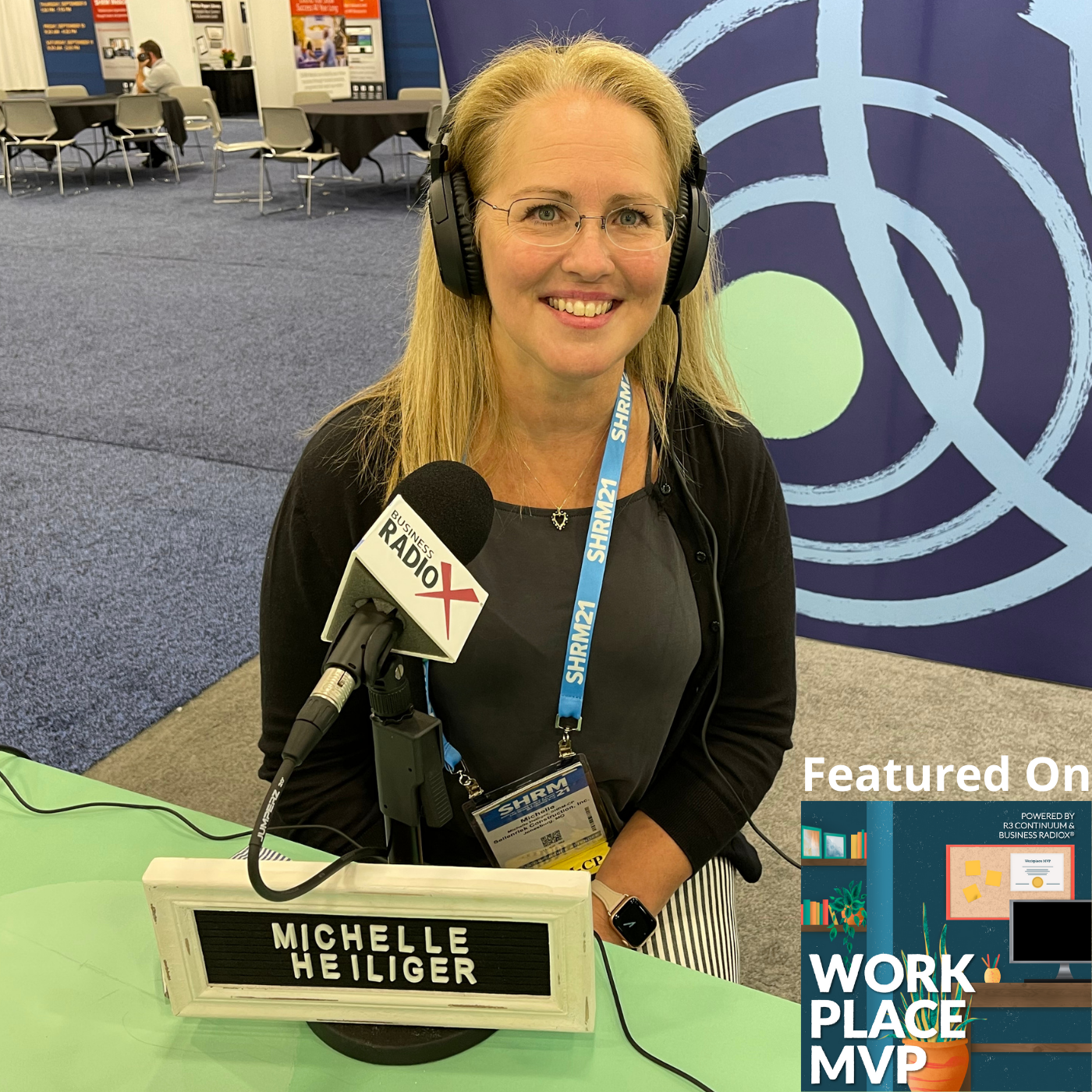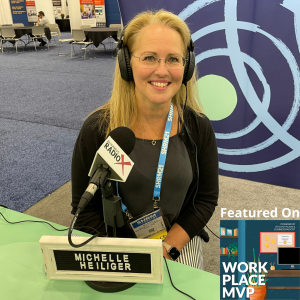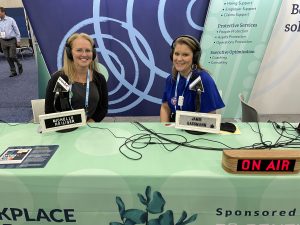

Workplace MVP LIVE from SHRM 2021: Michelle Heiliger, Sellenriek Construction
Speaking with host Jamie Gassman live from SHRM 2021 in Las Vegas, Michelle Heiliger, Director of Human Resources with Sellenriek Construction, shared key pieces of advice from learning the business, investing in the development of people, giving younger workers leadership opportunities, and much more. Workplace MVP is underwritten and presented by R3 Continuum and produced by the Minneapolis-St.Paul Studio of Business RadioX®.
This show was originally broadcast live from the 2021 SHRM Annual Conference held at the Las Vegas Convention Center in Las Vegas, Nevada.

Michelle Heiliger, SHRM-CP, Director of Human Resources, Sellenriek Construction

Michelle Heiliger is Director of Human Resources for Sellenriek Construction.
She has been in HR for twenty-three years beginning at a Taco Bell franchise. She moved to Missouri and went to work for Sellenreik Construction. She began in training and development and is now Director of Human Resources.
Sellenriek Construction
Sellenriek Construction Inc. is a family-owned and operated utility construction company located in Missouri.
Robert “Bob” Sellenriek started his telephone construction company in 1979 with a vision, a used backhoe, a truck, a trencher, and 2 men. Today, Sellenriek Construction, Inc. operates from five locations and employs almost 150 people. Sellenriek Construction was founded on March 12th, 1979 by Robert “Bob” Sellenriek and his wife, Dixie. Prior to this, Bob had worked for L,P&H and Burnup & Sims for ten years. At its beginning, Sellenriek Construction’s areas of service were primarily in east-central Missouri.
About Workplace MVP
Every day, around the world, organizations of all sizes face disruptive events and situations. Within those workplaces are everyday heroes in human resources, risk management, security, business continuity, and the C-suite. They don’t call themselves heroes though. On the contrary, they simply show up every day, laboring for the well-being of employees in their care, readying the workplace for and planning responses to disruption. This show, Workplace MVP, confers on these heroes the designation they deserve, Workplace MVP (Most Valuable Professionals), and gives them the forum to tell their story. As you hear their experiences, you will learn first-hand, real-life approaches to readying the workplace, responses to crisis situations, and overcoming challenges of disruption. Visit our show archive here.
Workplace MVP Host Jamie Gassmann

In addition to serving as the host to the Workplace MVP podcast, Jamie Gassmann is the Director of Marketing at R3 Continuum (R3c). Collectively, she has more than fourteen years of marketing experience. Across her tenure, she has experience working in and with various industries including banking, real estate, retail, crisis management, insurance, business continuity, and more. She holds a Bachelor of Science Degree in Mass Communications with special interest in Advertising and Public Relations and a Master of Business Administration from Paseka School of Business, Minnesota State University.
R3 Continuum
R3 Continuum is a global leader in workplace behavioral health and security solutions. R3c helps ensure the psychological and physical safety of organizations and their people in today’s ever-changing and often unpredictable world. Through their continuum of tailored solutions, including evaluations, crisis response, executive optimization, protective services, and more, they help organizations maintain and cultivate a workplace of wellbeing so that their people can thrive. Learn more about R3c at www.r3c.com.
Company website | LinkedIn | Facebook | Twitter
TRANSCRIPT
Intro: [00:00:03] Broadcasting live from the SHRM 2021 Conference at the Las Vegas Convention Center, it’s time for Workplace MVP. Brought to you by our R3 Continuum, a global leader in workplace behavioral health, crisis, and security solutions. Now, here’s your host.
Jamie Gassmann: [00:00:21] Hello, everyone. Jamie Gassmann here, your host of Workplace MVP. And we are broadcasting from SHRM 2021 here in Las Vegas, Nevada. And with me today, I have Michelle Heiliger, who is the Director of Human Resources from Sellenriek Construction. Welcome to the show.
Michelle Heiliger: [00:00:40] Thank you.
Jamie Gassmann: [00:00:41] Now, did I pronounce your name correctly?
Michelle Heiliger: [00:00:42] You did. You did great.
Jamie Gassmann: [00:00:43] Okay. Good. Now, why don’t we start out, Michelle? Tell us a little bit about your career journey and how you got into H.R. and kind of where it’s taking you.
Michelle Heiliger: [00:00:54] So, I’ve been in H.R. for, I guess, it’s been almost 23 years. I started out with a small 23 unit Taco Bell franchise. And actually started working in the office as the office manager and, basically, the franchise crew. And the owner said, “Look. I really need somebody who can do H.R. Can you go take this class?” I was like, “Why not?” And that’s sort of where it started.
Jamie Gassmann: [00:01:23] I started there, moved through multiple acquisitions, and ended my Taco Bell career with the largest franchisee in the nation. So, at that time, I was covering four states, about 150 stores. And then, I had a loss in my family and needed to not be on the road all the time. So, I moved home and was looking for a job closer to keep me local. I had a child in school still.
Michelle Heiliger: [00:01:52] So, I took a job with Sellenriek Construction, who is pretty close to my home. A family-owned organization who was looking for somebody who believed in teaching and development, who would come in and help them grow their organization. When I started with them, they had just a little over 100 employees. I’ve been there two years and we’re at 250, so huge.
Jamie Gassmann: [00:02:16] It’s grown. So, obviously, construction, fast food restaurants with franchising, two completely different worlds. What are some of the differences that you’ve had to navigate between the two as an H.R. representative?
Michelle Heiliger: [00:02:32] I think it’s more about taking knowledge, base knowledge, and applying it to a new situation. So, you’re still managing people. I’m fortunate to still work for an organization that really wants to do the best thing for their people. The challenge for me is that the motivation is completely different. You know, what motivates construction workers is completely different from what motivates Taco Bell employees. The other big difference for me is I deal far more with a rural organization now. Whereas with Taco Bell, it was more urban areas. So, their lives are different.
Michelle Heiliger: [00:03:17] You know, so from an H.R. perspective, the best way to empower your people and help understand them and help them grow is to understand their lives. And so, completely different mindset in the construction industry and the folks that I have now compared to where I was before.
Jamie Gassmann: [00:03:35] And so, you know, individuals coming into H.R. and new to that, how do you learn that? Like, how do you get to know those employees at that level? And how do you get comfortable? Because some people are afraid to learn people from their personal lives, but there’s so much power in it. So, what would you recommend to them and the benefits to that?
Michelle Heiliger: [00:03:55] So, if I were going to give advice to a new person coming into H.R., the number one thing that you have to be able to do is know your business. Because the people that are sitting at the table making the decisions, they already know their business. And in order to gain their trust and have them offer you a seat at the table is if you can have those conversations with them. You have to be able to speak on their level. You have to understand where their risks are. You have to understand where their opportunities are. And you have to be able to be their business partner.
Michelle Heiliger: [00:04:34] Otherwise, real life, you’re going to struggle in that role. You’re going to struggle getting the complete buy in from a leadership team. And by starting there and understanding the business, you know, you have to be willing to get your hands dirty to go out on a job site. Before it was, you had to show up in a restaurant, you had to show up in a restaurant at midnight. H.R. is not an 8:00 to 5:00 job in most cases. So, you have to be willing to do those things in order to be successful and to get the buy in from the team members.
Michelle Heiliger: [00:05:07] You know, laborers will call me, operators will call me, but it’s because they know I’ll show up in a shop or I’ll show up on a job site. And you know, I’m not just some girl sitting in the office. So, in order to progress in your career and get where most people want to go, you have to be able to do those things, you have to want to do them.
Jamie Gassmann: [00:05:25] Yeah. You got to show up and meet them where they’re at. Especially in a construction site, I can’t imagine. So, there’s lots of different things. What are some of the most common things from an H.R. perspective that you deal with in the construction industry?
Michelle Heiliger: [00:05:38] Well, for me right now, the biggest piece is the growth and development. In most construction organizations, they don’t invest at the foreman level. So, one thing that we did this year is we created a foreman development class. We tapped 50 guys from the field and we brought them in for four months straight. We bring them in for three days at a time. And pulling that many guys out of the field at one time is huge. But it was our commitment this year. It was our commitment to our people.
Michelle Heiliger: [00:06:12] And so, we offered them this, and it was everything from leadership to P&L. Understanding your P&L, understanding where your bottom line is, where do we actually start to make money, how do you get an extra five points on a job. Those are all things from a foreman level that these guys had never been introduced to.
Michelle Heiliger: [00:06:31] So, when you invest in your people and they see that every day, then you get their buy in. You’re opening a door for them. Like, “If I’m willing to do this and learn these things, I can get ahead.” In the average construction industry the age is 47, that’s about the median. In our company, the average age is 27. We have foremen that are 20. Because our leader, Bob Sellenriek, is a firm believer in the idea that you can be young and work hard. And they still want to grow. And they still want to support their families. And they want to do all the same things that all these other guys want to do. And if you give them that opportunity to do it, they will rise to the occasion, and we’ve seen that happen.
Jamie Gassmann: [00:07:17] Yeah. Like giving them a chance for career development that maybe they didn’t think they’d have the opportunity with.
Michelle Heiliger: [00:07:23] Yeah, for sure. And we started an apprenticeship program this year. So, the Department of Labor has tapped 25 companies across the nation to start an apprenticeship program for overhead and underground fiber installation. And that’s what we do, we deliver the internet. So, we design and build fiber networks. And we were one of the companies that were chosen.
Michelle Heiliger: [00:07:47] So, this year, we have worked really hard to develop an apprenticeship program within our organization. It’s another opportunity for our guys, “Here’s a career path for you, which is great because not only does it help them, but it holds us accountable.” You know, we’ve given them a career path here, the things that we are required to teach you, and it sets a timeline for us as well. So, it’s really been a good thing all the way around.
Jamie Gassmann: [00:08:12] And I imagine that helps from a talent recruitment perspective. Because, you know, I’ve heard a lot here at the show about how talent and acquisition has been really challenging, especially with the group resignation and everything of that nature. So, when you go out for recruiting, you know, is this something that you share with them in terms of outlining that career path? And how has that helped you in competition with other maybe construction companies that are in your area?
Michelle Heiliger: [00:08:40] For sure, it helps us. We kind of switched gears a little bit. Job fairs, per se, have always been a struggle for me. I’ve never really found that you get a lot of return on that investment. It’s a lot of time that you spend sitting at a table and you’re hoping they’ll come and talk to you. And so, we’ve sort of switched gears and we’ve created career days where we bring high school students who potentially don’t have a path, either they know they want to go to a technical school or they just don’t have a path out of high school. And we invite those schools to bring those kids to our campus.
Michelle Heiliger: [00:09:18] And we walk them through every job that we have available that you could get right out of school. And then, we tie in the apprenticeship programs. We have State Technical College out of Linn, Missouri, it’s a tech school. And we invite them to the campus the day we have it. So, we kind of create these moments, per se, for these kids to come in and talk to people who are close to their own age who they see as being successful. “Here’s where I started. Here’s what I’ve done to get here.”
Michelle Heiliger: [00:09:48] And we introduce a couple of ideas to them, first of all, that the number one thing that they have to have in order to do this job is the ability to work hard. We can train you to do anything else, but you have to bring that piece to the table.
Jamie Gassmann: [00:10:03] Bring your good attitude, positive attitude, willing to put everything out.
Michelle Heiliger: [00:10:08] Yeah, for sure. And then, we kind of challenge them as we go through the day with, “As you go to interview – like, we want you to go to interview with other people – here are questions you should ask. Like, what is my career path? What is that going to look like for me? What do I have to do to get to the next level? You know, what kind of benefits are you going to offer me?” So, we kind of make it an educational experience for them as well so that when they walk away, it kind of gives them some things to think about.
Michelle Heiliger: [00:10:32] You know, in my mind, from my perspective, if they go to another company and they ask three of those questions, probably at least one of them, the company is going to be like, “This kid is 18 years old. I can’t even believe this is happening.” So, for me, that’s a win. And then, if they remember that’s where that came from, in most cases, they’re going to come back.
Jamie Gassmann: [00:10:53] And that’s great because you’re meeting those individuals, almost like you’re connecting with the target audience you need to connect with for recruitment as opposed to waiting and hoping that that comes your way. You’re really kind of forging the path to make sure they come to you directly. Fascinating. And giving them hope, probably, too, especially if they didn’t have any direction. That’s fantastic. It sounds really creative and a great way to kind of change the script a little bit on that whole recruitment side of things.
Michelle Heiliger: [00:11:20] Yeah. Well, and that’s the boat everybody’s in right now. You’ve got to think outside of the box. If you’re not thinking outside the box on how to get there, then you’re pretty much standing still.
Jamie Gassmann: [00:11:31] Yeah. Interesting. Yeah. Great advice and great techniques. So, if somebody wanted to get a hold of you and kind of talk a little further about some of those innovative approaches you’ve implemented, how would they be able to do that?
Michelle Heiliger: [00:11:42] Well, they can reach out to Sellenriek Construction online. We’re on Facebook. We’re on LinkedIn. You know, any of those comes directly to me because I manage almost all those platforms. So, it’s really easy.
Jamie Gassmann: [00:11:57] That’s awesome. Like, it’s all me.
Michelle Heiliger: [00:12:00] So, go on to any of those things and you’re probably going to get a direct line.
Jamie Gassmann: [00:12:03] Yeah. That’s fantastic. Well, thank you so much, Michelle, for joining us on the show today. And I hope you have a great rest of your SHRM Conference experience.
Michelle Heiliger: [00:12:10] Yeah. Thank you. I appreciate it.














